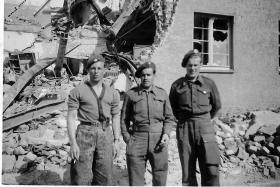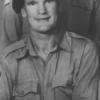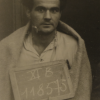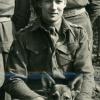Operation Market Garden, Arnhem September 17 1944
In his own words, Lance Sergeant Stanley Halliwell 1st Parachute Squadron R.E.
1.“I was with the Para Engineers at Arnhem. When we got to the bridge it was dark. We saw these figures moving on it so Captain Livesey our platoon commander called out, ‘Is that you, 2nd Battalion?’ A burst of Schmeisser splattered against a wall, so it was obvious they weren’t! He told us to occupy the office buildings, quite close to the ramp, leading up to the bridge, and we stayed there all night. Other Engineers, had gone under the ramp, occupied a building on the opposite side, and ambushed some German armoured cars, which burned all through the night.
The following morning I thought we were a bit exposed using the windows so I reckoned it would be better if we knocked a hole in the wall at floor level and fired from there. I managed to get hold of a sledge hammer and while I was swinging this my mate Ashworth was holding the long chisel. We got through the first layer of brickwork and I thought ‘One big blow and we’ll be through’. It was still a bit dark, but I swung the sledge hammer and brought it down, missed, and hit Ashworth smack in the face! You should have heard him! He lost three or four teeth and there was a lot of blood. I dragged him over to the medics, who asked what had happened. When I told him he just laughed his head off. They plastered his mouth and put a cigarette in and left him.
(footnote: After the war at many re-unions Stan attended he was constantly ribbed by his fellow comrades for, in their words “wounding poor Ashworth far more than the Germans ever could").
At one point about 30 yards in front of us was a tank with another close by. Major Murray studied it for a bit, and then sent someone off for a PIAT firer. I thought there was nobody inside so Hicks and I ran towards it. As I got within 15 yards I saw one of its small guns traverse. I ducked down and my mate Hicks, who was right behind, was hit and killed. (This was Sapper Terrence G. Hicks, GM, service number 2090980. Died 19/09/1944 aged 24. Son of Robert Percy and Annie Hicks, of Canton, Cardiff).I don’t know why, but I thought the best place was underneath the tank. As I lay there panting I could hear the radio, in German, talking to the other tank. Then he opened up with his main armament and nearly blew my eardrums. As if that wasn’t enough, he began to start the tank. Then one of our lads hit it with a PIAT. I thought ‘Christ, I’ve had enough of this!’ I crawled out and put my hands up and was taken prisoner.
The Germans sent me back to Colonel Frost with a message! I agreed to go but at every corner I came to, some bugger fired at me. Eventually I found Colonel Frost and delivered the message. He said, ‘Well if you go back, tell them to go to hell.’ So I thought, ‘I’m not going back to tell them that,’ so I stayed.
From then on we were just being chased from building to building, hiding where we could. We sheltered in a room but the Germans set the roof on fire, and it just burned down on us – we were being roasted alive so we had to get out of that. We were really whacked. We hadn’t slept for over 48 hours. We had taken some pills to keep us awake, but we had used them all up. I’d lost everything because the Germans took my pack when they had me prisoner. I had nothing. We were pretty soon picked up and I became a prisoner once more. We’d done all we could.
Source: Men of the Red Beret; Airborne Forces 1940-1990 by Max Arthur
Pages 199-200. Century Hutchinson Ltd, Published 1990. ISBN 0 09 173931 4
(2) 2.As I knew (‘I’ being Major-General John Frost) that I would be involved as a consultant for the bridge sequences, (talking about the making of the film ‘A Bridge Too Far’) I was most anxious to see the script before it was finalized. I had been told that the script was the film maker’s bible and that once it had been fixed it could not be undone. As the time of filming approached and I was still uninformed, I became more and more anxious. It then so happened that, in February 1976, I was invited to lunch by the Prime Minister, Harold Wilson, at No. 10 Downing Street- the Dutch Cabinet were visiting and it was thought that I could help to amuse them. After lunch Lady Falkender, the Prime Minister’s famous secretary, approached me and said, ‘I Hear that you will be concerned with the film A Bridge Too Far. The Prime Minister is very keen that we should do all we can to help. Have you anything to suggest?’ I then told her about our difficulties in getting a look at the script and she said she was sure that she could arrange things. Two days later, my copy arrived.
Well knowing how the views of American script writers and film producers differ from our own more mundane outlook, I was agreeably surprised as far as the bridge chapters went. I had only one adamant objection to the treatment given to an incident when the Germans sent one of our own captured sappers back to me with a message to the effect that, as we were in such a hopeless position, would I personally meet the German commander, under a flag of truce, to discuss surrender. I said, ‘Tell them to go to hell.’ Sergeant Halliwell, the sapper, replied ‘Do I really have to go back to tell them?’ I answered, ‘No. It is up to you. If you would like to stay and continue fighting, they will get the message anyway.’ He stayed.
The film script however, demanded that I (or rather the actor, Anthony Hopkins, playing me) should actually meet the German general and tell him that I had no room for him or his soldiers as prisoners, and so he would have to continue fighting. Magnificent cinema, perhaps, but so divorced from reality that it was laughable.
In the end a very unsatisfactory and most unrealistic compromise was reached, in which one of ‘my’ officers sarcastically informed the Germans that ‘we’ could not accept their surrender. A few years later, when I asked Major-General Heinz Harmel, the GOC. of the 10th SS Panzer Division, what he and the Germans thought of the film, he mentioned this particular episode as being quite ridiculous.
Source: A Drop Too Many by Major-General John Frost CB DSO MC (biography).
Pages 253-254. First published 1980 by Cassell Ltd ISBN 0 85052 927 1
3.Major-General Heinz Harmel, the Frundsberg Division commander, was irritable and more than a little frustrated. Despite constant pressure from General Bittrich, he had still been unable to blugeon Frost and his men from the Arnhem bridge. ‘I was beginning to fell damn foolish,’ Harmel recalls.
By now he knew that the paratroopers were nearing the end of their supplies and ammunition. Also, their casualties, if his own were an example were extremely high. ‘I had determined to bring tanks and artillery fire to bear and level every single building they held,’ Harmel says, ‘but in view of the (3) fight they were putting up, I felt I should first ask for their surrender.’ Harmel ordered his staff to arrange for a temporary truce. They were to pick a British prisoner of war to go to Frost with Harmel’s ultimatum. The soldier selected was a newly captured engineer, 25 year old Sergeant Stanley Halliwell, one of Captain Mackay’s sappers (error, he was in fact one of Lieutenant Dennis Vernon’s sappers).
Halliwell was told to enter the British perimeter under a flag of truce. There he was told to tell Frost that a German officer would arrive to confer with him about surrender terms. If Frost agreed, Halliwell would once more return to the bridge to stand unarmed with Frost until the German officer joined them. ‘As a POW I was supposed to return to the Jerries as soon as I delivered the message and got the Colonel’s answer and I didn’t like that part of the business at all,’ Halliwell says. The Germans brought Halliwell close to the British perimeter where, carrying the truce flag, he crossed into the British held sector and arrived at Frost’s headquarters. Nervously, Halliwell explained the situation to Frost. The Germans, he said, believed it was pointless for the fight to continue. The British were surrounded with no hope of relief. They had no choice but to die or surrender. Questioning Halliwell, Frost learned that ‘the enemy seemed to be most disheartened at their own losses.’ His own spirits lifted momentarily at the news and he remembers thinking that ‘if only more ammunition would arrive, we would soon have our SS opponents in the bag.’ As to the Germans request for negotiations, Frost’s answer to Halliwell was explicit. “Tell them to go to hell,’ he said.
Halliwell was in full agreement. As a POW he was expected to return but he did not relish the idea of repeating the Colonel’s exact words and, he pointed out to Frost, it might prove difficult to return through the lines. ‘It’s up yo you to make that decision,’ Frost said. Halliwell had already done so. ‘If it’s all the same with you, Colonel,’ he told Frost, ‘I’ll stay. Jerry will get the message sooner or later.
Source: A Bridge Too Far by Cornelius Ryan.
Pages 301-302 Published in 1974 by Book Club Associates London. (No ISBN number in my copy).
Source:
Created by R Hilton with information kindly supplied by P Halliwell (son)
Read More





Latest Comments
There are currently no comments for this content.
Add Comment
In order to add comments you must be registered with ParaData.
If you are currently a ParaData member please login.
If you are not currently a ParaData member but wish to get involved please register.